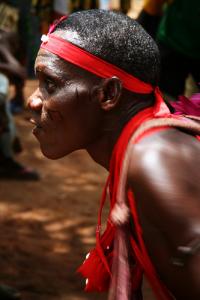Posted on December 6, 2009

On 8-9 December 2009 the Department of Arts and Culture took its draft Living Heritage Policy to public consultation at Gallagher Conference Centre. This draft policy was produced through a long process of research and targeted consultation by an expert panel set up by the previous Minister, Pallo Jordan in 2007. The excellent discussions at the consultation were testimony to the strong leadership and expertise developed within the Dept of Arts and Culture's Heritage section, as well as to the policy drafting team, led by Dr Pearl Sithole, Prof Muxe Nkondo and Dr Kenneth Netshiombo.
Although nationally our progress has been applauded from several quarters including UNESCO, South Africa must now ratify the 2003 Convention to broaden African participation within it. Globally, there has been significant support for the 2003 Convention on ICH. It is the fastest-ratified Convention in the UNESCO stable. The Convention is an attempt to broaden the definition of heritage beyond the iconic cathedral or waterfall that claim ‘outstanding universal value’, to include cultural practices and knowledge systems, performing arts and ritual, which are of value to local communities. The Convention established two international lists, called the Representative List of the ICH of Humanity, and the List of ICH in need of Urgent Safeguarding.
It's a democratic Convention, seeking to change the traditional power imbalance in heritage management between communities, outside experts and the state. It has been embraced and supported by developing countries, who see it as a way of addressing imbalances in the 1972 World Heritage Convention. The 2003 Convention has even been referred to as 'Africa's Convention', because of the emphasis placed on intangible heritage within the African context. But in the recent Intergovernmental Committee (IGC) meeting of the 2003 Convention in Abu Dhabi, only a handful of African elements were inscribed on the two international lists established under the Convention. Only a few African elements were inscribed on the Representative List because they had previously been declared Masterpieces of the Oral and Intangible Cultural Heritage of Humanity. Africa is thus severely under-represented on the Representative and Urgent Safeguarding lists. Very few African NGOs have also applied for accreditation under the Convention.

In the past, South Africa has played an active role in the formulation of the text of the Convention and, through contributions at expert meetings, in the formulation of its Operational Directives. South Africa was also one of the 120 countries who voted for the Convention's establishment in 2003. Although by December 2009 almost all of these 120 countries will have ratified the Convention, South Africa has not yet done so. By contrast, South Africa plays an active role in the World Heritage Convention and has already ratified the 2005 Convention on Cultural Diversity.
It is appropriate to consider possible positive and negative implications of ratifying such a convention, and the Cabinet may be waiting for the national policy on Living Heritage to be passed first. It may be that South Africa is struggling with the political implications of taking on the issue of intangible heritage as 'ethnic tradition' but at the national level South Africa is already giving traditional leaders more power and status within the democratic state; the notion of living heritage is already part of our heritage language and legislation. There is also no need to see the Convention simply in narrow ethnic terms, and our Constitutional commitment to human rights and freedom of cultural and religious affiliation reminds us of that.

The Department of Arts and Culture has already put significant effort and budget into the development of a draft national policy on ICH and received community support in its quest to ratify the Convention over a year ago. Perhaps the success of the consultation process around the draft Living Heritage policy will lead to greater official participation in the debates about the 2003 Convention at international level.
Harriet Deacon of the Archival Platform, lead author of The Subtle Power of Intangible Heritage, was on the expert panel and was an examiner for an African element that was among the first nominations made to the two lists at the IGC meeting in Abu Dhabi.
Photo attributions:
Xhosa woman with face clay:
Dancer in Possotome: In Possotome, all the villages along Lake Aheme congregate once a year for a giant dance competition. This man was a chief from one of the lake villages, performing his dance in the competition. http://www.flickr.com/photos/adamcohn/ / CC BY-NC-ND 2.0
Bokkoms: